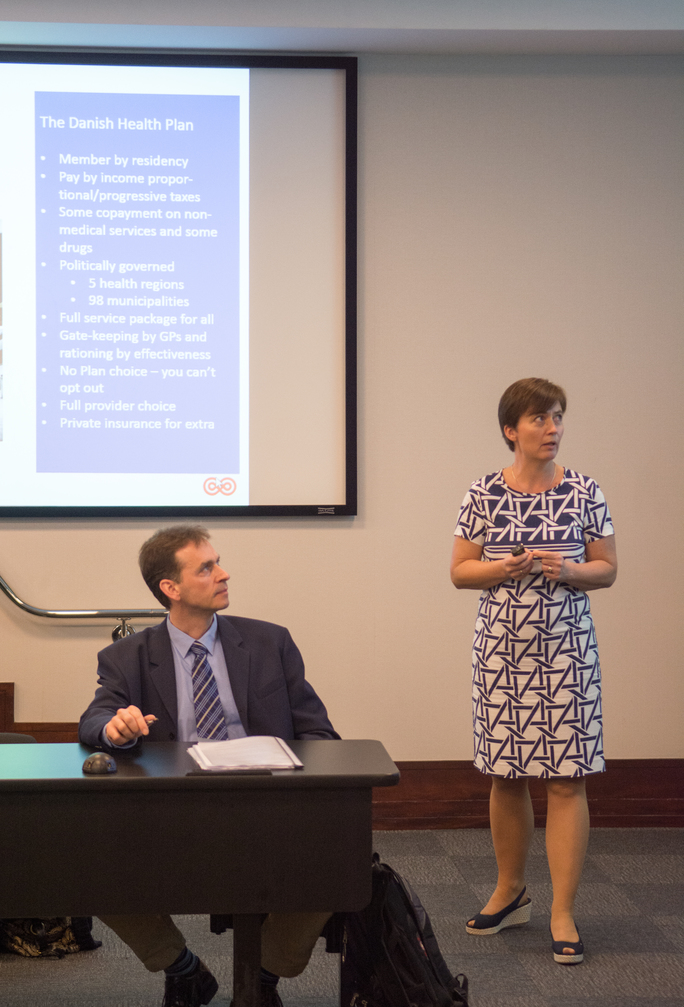Mays hosts Patients’ Cancer Hospital
March 28, 2017
|
Mays Business School
On March 27, Leonard Berry, a University Distinguished Professor of Marketing at Texas A&M’s Mays Business School, hosted representatives from the Patients’ Cancer Hospital in Denmark in a new Undergraduate Honors Healthcare class (MKTG 489) at Mays.
The 15 medical doctors and executives are visit ing the United States as part of an “inspiration trip” to learn from and share ideas at M.D. Anderson, then other American cancer hospitals. Berry met these doctors when he was in Denmark last summer and gave
ing the United States as part of an “inspiration trip” to learn from and share ideas at M.D. Anderson, then other American cancer hospitals. Berry met these doctors when he was in Denmark last summer and gave
a presentation at the Patients’ Cancer Hospital.
Dr. Dorthe Cruger, CEO of Lillebaelt Hospital and chairman of the Danish Cancer Society, discussed the creation of the new Patients’ Cancer Hospital, which is part of The Lillebaelt Hospital. Denmark launched a new comprehensive and national cancer plan titled “The Patients’ Cancer Plan.” The Cancer Society and hospital teamed up to identify what matters most to patients and not simply provide what the hospital believed they needed. “The vision and mission of the hospital, is always the patient first,” said Cruger.
The Danish Health Care System is a national health care system supported by an average tax of 50 percent of an individual’s salary to support free health care, a university education, and other social services. Denmark has one health plan and spends 50 percent less on healthcare than the U.S. In the national patient survey for Denmark, a 95 percent patient satisfaction rate is the goal. It measures several factors including whether patients and their relatives participate in decisions about treatment.
Dr. Jakob Moeller, chief physician and radiologist, discussed the fast-track cancer pathways in Denmark and how it all began. There was a commitment to change the issue of long waiting lists, including an average of six weeks for simple chest X-rays, he said. Changes in his radiology department included improving efficiency with equipment placement, revising the verification process, transitioning to an electronic work process, and using speech recognition to take physician notes. The purpose was never improving survival rates – it is about improving patient care to reach diagnostic conclusion in a timely manner. “We like to be on the forefront. We like to be there where it matters,” says Moeller.
Chief Physician Dr. Karina Dahl Steffensen, who is also an associate professor and center director, addressed “How to Build a Centre for Shared Decision Making in Denmark.” Doctors are experts in the diagnosis, and the patients are experts in their own lives. Therefore, the decision about the right treatment should be made by the patient and doctor together,” she said. “There must be a real choice (several options) for the patients,” she said. One project included developing decision aids for the patient, including decisions about lowering the risk of cancer’s return.
Dr. Lars Henrik Jensen, chief physician, associate professor, and president of the Danish Society of Clinical Oncology, addressed “Moving cancer specialists from treating tumors to treating patients.” There is always a choice that ranges from doing nothing to doing everything, he said.. “Who am I to dictate a treatment if I do not explain the benefit of a treatment and all of the side effects?” said Jensen. He discussed the doctors’ partnership, a collaboration between cancer specialists and family doctors. The triangle includes the patient, oncologist and general practitioner. “By focusing on what matters to the patient, and how the doctor can support that, this is the way to personalize medicine and improve the quality of the treatment,” he said.
Overtreatment can be dangerous, Cruger said. “It’s not about the number of days for the patient, but the quality of their days,” she explained. For the elderly, it’s about how one wants to spend the last few years of his or her life.
 Health care is on the top of most agendas today, and at Mays Business School, it is one of the three Grand Challenges – areas that are deserving of laser focus and hefty resources. The school’s arsenal of expertise on the topic is led by Berry. He helped found the research domains of services marketing and service quality, and he pioneered the now-foundational concept of relationship marketing. These days, his research and teaching focus on the service quality of health care.
Health care is on the top of most agendas today, and at Mays Business School, it is one of the three Grand Challenges – areas that are deserving of laser focus and hefty resources. The school’s arsenal of expertise on the topic is led by Berry. He helped found the research domains of services marketing and service quality, and he pioneered the now-foundational concept of relationship marketing. These days, his research and teaching focus on the service quality of health care.
“I haven’t visited any cancer center in the U.S. that is more progressive and humane than The Patients’ Cancer Hospital,” said Berry. “We need to get out of our country, as there’s a lot to learn outside the U.S.”


